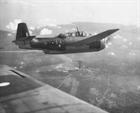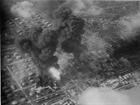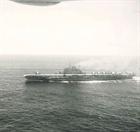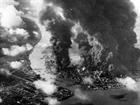PALEMBANG REMEMBERED ON 70TH ANNIVERSARY
Fleet Air Arm aviators at Royal Naval Air Station Culdrose are marking the 70th Anniversary of one of the most important actions of their distinguished history.
In January 1945 as the Allies closed in on Japan, Naval aircraft from the British Pacific Fleet launched raids on the Japanese held oil refineries at Palembang in Sumatra, part of what is now modern day Indonesia. The strikes onPalembangcode-named Operation Meridian were the largest operations the Fleet Air Arm has ever been involved in as a stand-alone force and are estimated to have destroyed as much as two thirds ofJapan’s supply of aviation fuel.
The attacks took place on 24th and 29th of January 1945 from four Aircraft Carriers, HMS INDOMITABLE, VICTORIOUS, ILLUSTRIOUS and INDEFATIGABLE. Avenger bombers of 820, 849, 854and 857 Naval Air Squadrons, each armed with four 500 lb bombs, attacked the refineries. This strike force was escorted by Corsair and Hellcat fighters, whilst Fairey Firefly aircraft would dual role as escort fighters and an additional strike element with 60 lb rockets. Additional Corsairs conducted ‘Ramrods’ – offensive fighter sweeps – ahead of the force over the Japanese airfields within range of the attacks. A secondary raid was also planned against the coastal town ofManaand, with Hellcats flying photo reconnaissance and two Walrus amphibious aircraft on standby for Search and Rescue of downed aircrews. The total strike force totalled a staggering 244Royal Naval aircraft.
The cost was high -41 aircraft were lost (16 to enemy action, 11 ditched and 14deck crashes with 34aircrew killed) in training for and carrying out the attacks. The air group also accounted for 140 enemy aircraft, plus a large oil tanker and several merchant ships. Of the two refineries attacked one’s output was halved for three months and its oil storage facility destroyed, the other refinery was stopped completely. The effect of the shortages on the fighting inBurma, thePhilippines,ChinaandOkinawaare incalculable, but it is probable that the strikes were the British Pacific Fleet’s greatest contribution to the ultimate victory of World War Two.
Commander Jason Phillips, who is in charge of flying at RNAS Culdrose, believes the strikes from the British Aircraft Carriers played a crucial role in the war against Japanin the Far East. “The Palembang raids were a great success, testament to the bravery and professionalism of the aircrews and ground crews involved. Remembering their exploits over seventy years later, is particularly poignant to us all here at Culdrose as those four Avenger Squadrons 820, 849, 854 and 857 have been Culdrose-based for many years, and although flying different aircraft – Merlin and Sea King - are still engaged in operations today. This demonstration of British Carrier power is a timely reminder to us all as we prepare to welcome our largest carrier ever, HMS QUEEN ELIZABETH, into service”.






